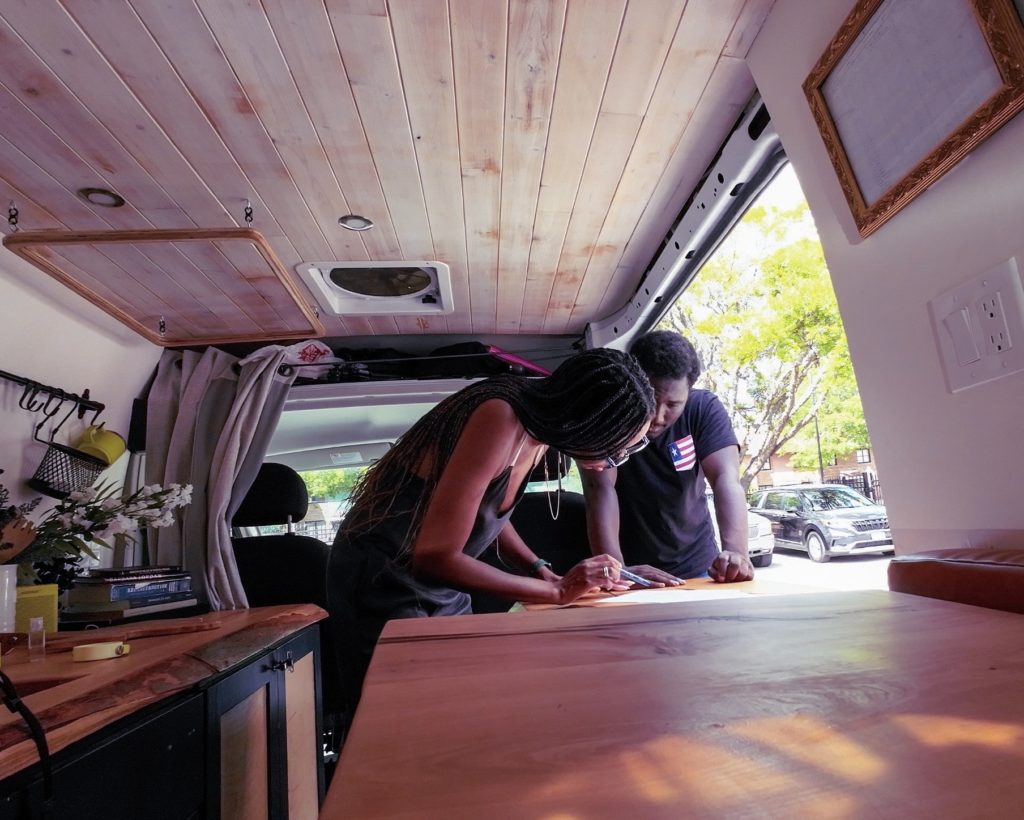Registering Texans to Vote With My Van Named for Barbara Jordan

Nearly 50 years have passed since former U.S. Rep. Barbara Jordan’s (D-Texas) crowning achievement bringing Texas under the protection and authority of the Voting Rights Act. Since then, thanks to attacks from Republicans and the U.S. Supreme Court, voting has gotten harder in many states, but Texas ranks dead last. It’s a fact I was well aware of when her work inspired me to work remotely and live full time in my converted camper van named “Barb” so that I could travel across our home state and register voters.
It wasn’t until my road trip was well underway that I fully grasped how difficult this effort would be. Texas has refused to expand online voter registration and remains one of the few states with a volunteer deputy registrar certification requirement (meaning, that in order to legally help register a fellow Texan to vote, you must first get permission or certification from the county). Since Texas doesn’t have a statewide certification program, someone like me hoping to register voters across the state has to stop at the elections office in each county to get certified. And even after putting in the hard work to get certified in each of the 254 counties (yes, there are that many counties in Texas), those certifications expire at the end of each even-numbered year.
These restrictions on voter registration undoubtedly contribute to Texas’ consistent ranking as one of the worst states for voter turnout in the country. But once I secure all necessary approvals to help someone register, the next step is often the hardest: convincing fellow Texans that they actually should register to vote. The pushback I receive the most? That voting doesn’t matter and, in a state that’s remained fully under Republican control for more than two decades, it seems impossible that one vote could make a difference.
When I meet Texans out on the road who are hesitant to vote, I tell them that we must fight back against those who are harming our communities and build political power by voting all the way down the ballot each and every election.
It’s easy to understand why: partisan gerrymandering has wiped competitive congressional and state legislative districts off the map here in Texas, and the stranglehold Republicans have maintained over state leadership, crisis after crisis, has further disillusioned our rapidly diversifying state.
Those of us who did turn out to rebuke former President Donald Trump at the ballot box and gave Democrats control of the U.S. House, Senate and White House are understandably frustrated with the lack of progress on the very priorities that pushed us to show up at the polls in the first place. And the paralysis of our institutions in the face of an alarming democratic backslide has left many of us who voted even further disenchanted by our political process.
After all, the catalyst for my own one-woman protest was the Senate’s choice to protect the filibuster instead of our equitable access to the ballot — the sacred lynchpin of a multi-racial democracy. As someone who hit the road to help Texans of all stripes engage in the democratic process, I can confirm that those of us who follow politics enough to be upset about the filibuster and its impact on our democracy are far outside the norm of the American public. And the research backs this up — polling shows that less than 20% of Americans consider themselves “very familiar” with the filibuster and 40% said they weren’t very familiar with it or hadn’t heard about it at all.
It’s a reminder that as infuriated as we all are to see freedoms we’ve enjoyed for a generation being stripped away, we can’t afford to overestimate the salience of the issues that animate us the most with the broader American electorate. As such, it is on those of us stepping into the arena as engaged voters to follow the lead of the civil rights champions and Freedom Riders who came before us to help expand the electorate and illuminate for Americans who are not yet engaged why it’s important for them to make their voices heard, too.

The day after the U.S. Supreme Court overturned Roe v. Wade, I was in Waller County, Texas. After getting certified to register people to vote in the county, I spent the day talking about civic participation with a leadership conference of high school girls who aren’t yet old enough to vote. We discussed how to get the adults in their lives engaged following the recent shooting in Uvalde, Texas and the devastating anti-choice ruling that had come down from the Court the day prior. One of the high schoolers asked a question that stuck with me: “Where are we supposed to learn about these things so that we can get more people to do something about it?”
As more news breaks about those with pregnancy complications being denied life-saving care, and as we learn more about the extent to which Republicans have been willing to coordinate with right-wing militias to further their own electoral gains, we must be relentless in informing our own concentric circles of what’s at stake in this upcoming election. If we don’t, then the choice to sit out in this year’s election will be felt and judged harshly by the generations who follow us.
When I meet Texans out on the road who are hesitant to vote, I tell them that we must fight back against those who are harming our communities and build political power by voting all the way down the ballot each and every election.
Often the outcomes of the races that fall towards the very bottom of our ballots are the ones whose impact will be felt most acutely in our day to day lives.
As broken as the electoral process seems now, history tells us it can, and will, get much worse if we don’t take a stand and make the choice to elect leaders who will protect our democracy from further erosion. But there’s no need to take my word for it; take it from a true founder of American democracy, the late U.S. Rep. John Lewis (D-Ga.): “The vote is precious. It is the most powerful non-violent tool we have in a democratic society, and we must use it. And so you must go out all across America and tell young people, and people not so young, tell all of us: Vote. The vote is powerful.”
The Texas deputy voter registrar requirement would have made Freedom Rides like the ones Lewis helped organize virtually impossible in the state of Texas. As we face a retrenchment of our hard-won rights alongside a historic onslaught of voter suppression, it should be apparent to all of us that this is not a coincidence.
Tayhlor Coleman is a seventh generation Texan living full time in her van named Barb to help register voters across the Lone Star State.